

A Conversation with Woodstock Icon Melanie
By Steven Jay Griffel
Queens, NY, USA
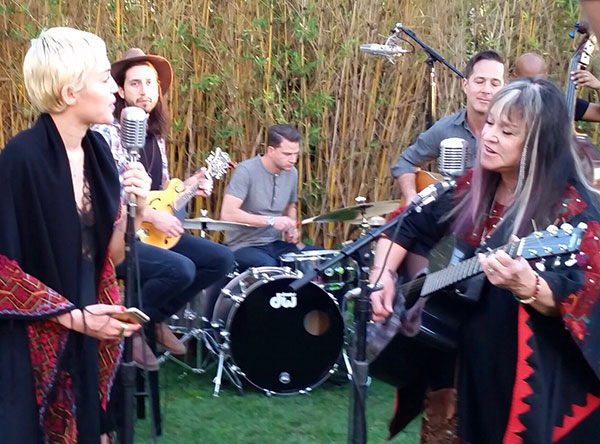
Miley Cyrus and Melanie at Miley's Backyard Session
(Photo courtesy of Melanie Safka)
Melanie Safka is a hippie hero & Always a prophet of peace...
– Miley Cyrus
Friday, 11:00 pm; August 15, 1969
A young singer named Melanie is sitting alone in a small tent, waiting to be led to an elevated stage and introduced to a vast audience, huddled on a huge hillside for a three-day music fest. I'm not there. I'm twenty miles away in a Jewish bungalow colony in the Catskill Mountains, sitting alone in the middle of a dark softball field, bemoaning my lonely, outcast state.
For forty years I bore the hot shame of not going with my friends to Woodstock. I could have participated in that signature moment, that epoch-defining event … if only I had dared. Then again … had I been part of the vast crowd that welcomed Melanie, I would not have written my debut novel Forty Years Later—or the other novels in my David Grossman series. I might not have become a magazine columnist. I might not have had the opportunity to interview Melanie Safka, Woodstock icon, who is still rockin' today.
STEVEN JAY GRIFFEL: You weren't well known before Woodstock, and yet you were flown to the site by helicopter. What's the story behind that?
MELANIE: I was very young and inexperienced, especially in terms of being on stage. I had only one recording, "Beautiful People," and that was played on only one radio station, WNEW FM, by one DJ, Roscoe. The biggest crowds I had ever performed in front of were on the streets of Greenwich Village and then Temple University.
My mother and I had underestimated—and that's an understatement—what I was getting into. I was picturing a pastoral setting with arts and crafts families and kids on picnic blankets. When we hit standstill traffic it still didn't occur to me that it had something to do with the event. I began to worry. The anxiety began to build right there, on Friday morning, day one. As we turned off the highway and turned on the news, my suspicions were confirmed. If I had been driving, I more than likely would've stopped the journey. But my mother kept driving till we got to the motel where we saw the media, Janis Joplin, and Sly Stone. I had never met anyone mainstream famous before. As we entered the lobby, someone in charge called me and led us to the helicopter. I'd never been in one before. Terror mounted. My mother wasn't allowed to go in the helicopter with me, and I didn't see her for the rest of the day.
Melanie Safka
STEVEN JAY GRIFFEL: When the helicopter landed, you were brought to a tent and left alone. What was it like waiting inside the tent?
MELANIE: I was led to a one-person tent with a box and a dirt floor. It felt surreal, as I was alone. I saw a large tent nearby and found out later that it was for the stars, entourage VIPs, etc. I wasn't invited, nor was I not invited.
Inside my tent I began to weave the saga of the end of my life. I couldn't imagine even going on the stage. I thought I would surely die. After a few minutes someone opened the flap of my little tent and said, "Get ready, you're on after Richie." Richie Havens was in his fortieth minute of "High-flying Bird" in which he broke into a refrain of "Freedom … freedom," but in my mind I heard "Save me, save me!"
What should I sing? How long should I sing? I didn't have a time constraint. I don't remember anyone saying 20 minutes 40 minutes, nothing about time. I heaved, and then again. Fortunately, I hadn't eaten or had anything to drink. Then someone opened the flap again but then said never mind. This went on throughout the day. At one point, before sunset, I ventured from my tent and was pulled toward the crowd. I was drawn, I wanted to go out there. The artist area was secured by some imposing-looking guys. One of them noticed I didn't have a backstage pass and was ushering me out of the restricted artists' area. I piped up, "No, I belong here! I'm Melanie!" I think I sang a few lines from "Beautiful People" and he let me go back.
STEVEN JAY GRIFFEL: What was it like performing at Woodstock?
MELANIE: I didn't leave the tent for a long while. Now, nightfall in the rain. Wavy Gravy's commune, Hog Farm, were passing out candles, thousands of them, and then the MC said something inspirational about keeping the candles a light in the rain. I absorbed all this without really hearing. I was thinking, "Maybe it will be over now, people will go home... It's raining!"
Ravi Shankar finished playing. I thought: "Time to go home?" But no. The person who opened my tent flap said, "You're on." I walked and walked onto a rope bridge and then it got quiet, real quiet. I watched myself take the stage, saw Melanie from above her right shoulder.... Then at some point I was singing "Beautiful People," I think, or "Close to It All." I was safe, shaken but safe. And as I sang I resonated with 500,000 people at one time. Quite a powerful resonance. A frequency so strong, people are still listening.
STEVEN JAY GRIFFEL: Legend has it that the concert tradition of holding aloft lighters and other flaming tributes began with your fans at Woodstock.
MELANIE: No, not my fans. I didn't have any yet. It was a coincidence that I was the one on stage when the candles were being passed out and, en masse, it seemed the hillside became a flickering of lights coming toward me.
When I did shows after that, especially in the northeast, people would light up as a show of kindred spirit, as a show that they were there at Woodstock. By the time my song "Candles in the Rain" came out, it became the thing to do when you went to a Melanie concert. Then that tradition continued for all concerts forever after, a sign: "Hey, we're all resonating!"
STEVEN JAY GRIFFEL: Tell me about your early life. Did you perceive yourself as an "outcast, oddball" or was that how others sometimes saw you?
MELANIE: I was misunderstood at school and at home. I ran away to ensure I wouldn't go to school anymore. I had no particular plans, agenda, or ambitions. I was just blowing an unhappy scene—as an outcast, an oddball. I thought "out there" there might be a place for me ... "out there" … maybe people more like me. I wanted so much to find where I belonged. I was desperate for connection with others. I was reading Kahlil Gibran, "who can depart from his pain and his aloneness without regret." I always played music. I didn't think I could ever earn a living at it. I was right!
STEVEN JAY GRIFFEL: I'm sorry I wasn't able to interview you in Nashville when the April dogwoods were in bloom. How did a girl raised in Queens wind up in Tennessee?
MELANIE: We moved a lot. My husband was a creature of impulse. Nashville was one of his last.
STEVEN JAY GRIFFEL: Your mother was a poet and a singer. You wrote: "Her tastes ran to the black side of white. She showed me how to breathe when I sang." What else did you learn from her?
MELANIE: I learned about beautiful sadness. My mother only listened to real, from-the-heart players and singers. She was not into glitz, glam, Broadway, schmaltz. I was raised on Charlie Byrd, Coltrane, Billie Holliday, Peggy Lee, Bessie Smith. I learned to love what was real and true from my mother. When you lose your mother, your father, you are no longer anyone's child. I miss her being that one phone call away.
Melanie with her son, Beau Jarred
STEVEN JAY GRIFFEL: Writing is an important part of your life. Describe what it means to you.
MELANIE: Sometimes lyrics are clever and have a rhythm and musicality all their own, having nothing to do with meaning or messages. Other times, my sensibilities, my philosophy, my reason for being needs a voice. I never try to push a point or sell an idea. In this I am immaculate.
STEVEN JAY GRIFFEL: You didn't formally study music. Explain how you can hum only one note at a time but your mind can imagine entire guitar chords—and how you are able to describe this to other musicians and engineers. Do you always write the music first, then the lyrics?
MELANIE: Sometimes I write a song, music and lyrics. Other times, the words already have a melody and I have to find it, or the melody is saying something I need to understand and I listen to its whisper…. Yeah, about the one note thing and hearing the chord, the harmony, the countermelody and trying to explain in words to a poor musician—that's why I connected with certain musicians because they could hear what I heard in my head. My son is now my exclusive translator—and then some!
STEVEN JAY GRIFFEL: You play the guitar, but I believe your voice is your greatest instrument. You wrote: "my voice and I share the same heartbeat. / We cannot be separated by / life, love or death." Tell me more about your relationship with your voice.
MELANIE: My voice when I was young was just a wild and crazy thing, uncontrolled and uncontrollable. It would scream … it would whimper … I wasn't sure if it was my voice, as I wanted to sound "older woman," permeated with the soul of suffering … the voice of reckless abandon, foreign or colored. I sponged it up and went out to imitate Billie Holiday, Jimmy Durante, Edith Piaf, Brenda Lee and got it wrong and became me. Now I don't listen to my voice so much, just as I don't look in the mirror as much. I just feel and let that carry my voice to the right places.
STEVEN JAY GRIFFEL: You have referred to your deceased husband Peter Schekeryk as the "number one producer of Melanie." How did he influence your professional career?
MELANIE: My answer could really be a book … a storybook. The way I met Peter was quite serendipitous. He was head of Hugo and Luigi's production company whose office I went into by mistake on my way to an acting audition. Hugo and Luigi saw a hysterical girl (as I was very late and in the "wrong place") with a guitar and said: "Joyce set her up for Thursday." So I came back Thursday, and they said "We'll set you up with Peter Schekeryk. We are writing a Broadway musical."
So I came back and sang my songs to Peter, and he was smitten. I had never smitten anyone before. He produced my first record and all the records that followed. From the moment I met him I was in his whirlwind. We married, had three children, and he handled every aspect of my career until his passing in late 2010. I didn't know it was a career. It was my life. I am now at a new beginning. Peter would always say, "Melanie you don't know who you are." In 2010 I began to find out.
STEVEN JAY GRIFFEL: I read somewhere that you don't own any of the rights to your past songs and performances. Is there a lesson here for other artists?
MELANIE: This couldn't be a lesson to anyone because this would not happen to anyone else. I married my producer/manager, and we had a 45-year relationship. I never wanted anything but to be able to create and live to do that. After Peter passed away, I found I did not own the rights to any of my 40-some years of work.
I will repeat this because I know most people find it unfathomable: I am not compensated for any of the work that I have done, only what I do and create moving forward, so I move forward.
Through the repeated use of my creations, work, and performances I earn a lot of money—I just don't happen to receive any of it. But an artist can never be poor.
STEVEN JAY GRIFFEL: I have to ask: If Peter was your manager/husband, how did your rights get signed away? Is this a "simple" case of mistakes made … or is there something else?
MELANIE: The worst part of that question is that the answer is a mystery, a case of mistakes, maybe, but truly a mystery. The business never liked me, they liked "Melanie." She sold 120 million records and made many people and companies rich. But me, no. In fact, I had to pay the price for writing some songs, like "Look What They've Done to My Song" and "The Nickel Song," both of which are critical of the music industry.
And I know what you're asking: Peter was the love of my life, the father of my three children. He was everything that made me, hence he would be part of whatever might break me.
And I do know what you're asking and what people might like to hear. But for the most part we lived life as one, lover friend brother sister … we were in it together, Mystery and Mistakes. I don't know what happened back then. I do know I wouldn't have agreed and wouldn't have signed any documents handing over my whole life. But I am where I am at this time without Peter by my side, and I will learn how to fight to become the fighter I never was, never had to be.
STEVEN JAY GRIFFEL: Do you continue to write and produce songs? Are you independent now or under contract?
MELANIE: In this time of the independent I am an extreme independent. I could have easily become what the major labels wanted me to become, but I don't think I could've lived with myself. It was an expensive decision to stay true to myself, as people in the 60s were fond of saying: "don't sellout" (lip service in most cases). I do continue to write and produce music. I am working, as we speak, on a new CD, which will be "launched" (that term makes me laugh) by the nonexistent (as of yet) independent label "Nobody Wants Me" Records. Has a certain ring to it, doesn't it?
Tales from the Roadburn Cafe
STEVEN JAY GRIFFEL: I read your published journal, Tales from the Roadburn Cafe. There are many generously revealing entries—but there are some notable omissions too. You write about your mother, but not so much about your father. You write quite a bit about your son Beau Jarred—but not so much about your other children.
MELANIE: It's a journal—what comes up, comes up. Beau Jarred is with me every day and on the road. My daughters Leilah and Jeordie are not. Leilah is gorgeous and a supermom—she has three children and is a writer in Nashville. Jeordie lives in Arizona and is a singer/songwriter. She is tiny but buff–pixie beast. My father played the saxophone but not often. He had a wicked sense of humor, which I identified with, and while he may not be mentioned by name, he is all over that journal.
STEVEN JAY GRIFFEL: Though you are readily associated with Woodstock, you have also appeared in toney venues like Royal Albert Hall, Carnegie Hall, the Metropolitan Opera House, the Sydney Opera House, even the General Assembly of the United Nations. Your multiple appearances on the Ed Sullivan Show and the Tonight Show with Johnny Carson introduced you to mainstream national audiences. Despite all this, you still seem uneasy with the idea of your celebrity. Your thoughts?
MELANIE: Yeah, funny huh? I'm told there are many performers who are introverts. Artists are not necessarily the personalities that demand attention. I think a phenomenon of today's music industry is that people become famous for being famous. Their best abilities run along exhibitionist lines. So much of the time the ones you hear and see are not the best, but rather the ones most in your face.
STEVEN JAY GRIFFEL: In your journal you refer to the "battle scars" of your career experiences. Which of those scars represents the most painful, hard-won experience?
MELANIE: For a while, in and out of time, I sensed, in the words of Morrisey, I was elbowed out. Ignored. I became industry invisible. The easy pitfall would be to fall into resentment and remain in anger, harbor grudges … feel self-pity. Being invisible has been quite an adventure, which I will now, as I rematerialize, as if by magic, recount…. What a rare life. I am enriched by all those years of exile, by growing and becoming who I am. Yes, Peter, I know who I am.
Miley Cyrus tweet
STEVEN JAY GRIFFEL: You recently worked with Miley Cyrus to video-record a couple of your classic hits including your new song "Yaw Baby." Miley's tweeted about the sessions and there were over 2 million views of the videos on YouTube. How did this event come about?
MELANIE: How did it come about … Yeah, who would've thought it would be me? It was a beautiful day of jamming that flowed into the night. We even sang a new song that no one had ever heard as the sun set in the Hollywood Hills.
I just see it though as a natural turn of events. We'd been communicating for a few years. She's got a real and authentic self that radiates through everything she does, including "Look What They've Done to My Song, Ma."
STEVEN JAY GRIFFEL: So, when Miley sings "Look What They've Done to My Song, Ma," you do not receive any monetary compensation for writing that song?
MELANIE: That would be nice, but no, I don't….
I've always so appreciated a singer who can take a song and make it their very own. She's a real interpreter. It's such a treasure to hear your song really sung and re-created, almost like the creation itself.
Music is such a unifying force, a thread that joins each to the other. In my nearly fifty years in the music business, in the midst of it, in the thick of it, on the periphery, I've observed a tendency and a deliberate attempt at divisiveness and polarization of musical styles and genres, certainly of age groups. I love and support the work that Miley and the Happy Hippie Foundation are doing. I'd like to think this may be the tipping point where the swing reverses. Like a wrecking ball?
STEVEN JAY GRIFFEL: You bloomed in the Age of Aquarius and are still rockin' in the Age of ARRP. How have your performances changed over the years?
MELANIE: At home we are mother and son. On the road, a duo, a gathering of artists. My son, Beau Jarred, is an astounding musician.
I'm sure I hear sniggering at the idea of rockin' in the age of ARRP—it takes a bit of the nobility away. I'm afraid what I do is not to be made light of by old people jokes. To present myself as I step into this aging thing is a supreme leap of faith as I go ahead and never warn anyone to go back.
Link:
Steven Jay Griffel at Stay Thirsty Publishing
Steven Jay Griffel on Facebook









